Featured Publications
Journal of Development Economics (2022)
School’s author: Devesh Rustagi
There is astounding variation in product quality sold in markets even when quality is difficult to ascertain and rules are poorly enforced. We investigate whether sellers differ in innate honesty (incur private cost to provide good quality) and whether this explains the variation in quality. Our study takes place in milk markets in India, where milkmen collude on price, customer rarely switch, and it is difficult to establish reputation. We invite milkmen to take part in a novel behavioural experiment to measure dishonesty. We then measure quality objectively as the percentage of water added to a litre of milk sold to customers.
Our results show that dishonest milkmen add significantly more water to milk. Evidence from milk-testing tournament confirms that milk quality is difficult to verify. These results suggest that some sellers are willing to forego monetary gains to provide good quality in return for utility from being honest, even in an environment that encourages cheating.
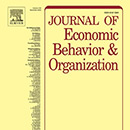
Journal of Economic Behavior and Organization (2022)
School’s author: Simon Gaechter
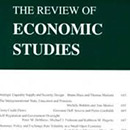
Review of Economic Studies (2021)
School’s author: Adam Spencer
This paper develops a quantitative open economy framework with dynamics, firm heterogeneity and financial frictions to study the impact of corporate tax reforms targeted at multinationals. The model quantifies their impact on firm selection, production and welfare. Firms draw idiosyncratic shocks, invest in capital, choose optimal financing and select endogenously into selling abroad, through exporting or FDI.
I apply this framework to the removal of the U.S. repatriation tax as in the Tax Cuts and Jobs Act. The reform’s impact trades-off two selection effects — more offshoring versus greater U.S. business dynamism. The reform leads to higher U.S. welfare at little cost to the Treasury. A series of exercises illustrate that the novel features of this framework have significant quantitative implications. The reform gives starkly different cross-sectional predictions and lower welfare gains when financial frictions are removed and it is welfare reducing in a static counterpart of the model.
Games and Economic Behavior (2021)
School’s author: Simon Gaechter
We study how compliance with norms of pro-social behaviour is influenced by peers' compliance in a dynamic and non-strategic experimental setting. We show that social proximity among peers is a crucial determinant of the effect. Without social proximity, norm compliance erodes swiftly because participants only conform to observed norm violations while ignoring norm compliance. With social proximity, participants conform to both types of observed behaviours, thus halting the erosion of compliance.
Our findings stress the importance of the broader social context for norm compliance and show that, even in the absence of social sanctions, norm compliance can be sustained in repeated interactions, provided there is group identification, as is the case in many natural and online environments.

Journal of Economic Behavior and Organization (2021)
School’s authors: Trudy Owens and Fabio Tufano
Using the Krupka-Weber norm-elicitation technique in a lab-in-the-field experiment in rural Kenya, we measure the social norms that regulate the trade-off between wealth accumulation through saving and sharing income with kin and neighbours. We find a plurality of norms: from a strict sharing norm prohibiting any form of wealth accumulation to a norm that allows moderate wealth accumulation. We show that several individual and social network characteristics predict the norms perceived and that the pro-saving norm becomes majoritarian when an individual can conceal their income from kin and neighbours.
In further exploratory analysis, we find some evidence that the type of norm individuals perceive mediates the effect of income secrecy on actual saving behaviour. Taken together, our results highlight the importance of measuring social norms when devising pro-saving policy interventions.

European Economic Review (2022)
School’s author: Giovanni Facchini
Is opposition to immigration deeply entrenched or is it open to updating in the face of new information? We explore this question by examining how attitudes of native citizens shift following exposure to information that points to potential upsides of immigration. We do so using a large-scale randomised experiment embedded in a text-comprehension study administered in Japan.
As part of the study, participants were subtly presented with information on social and economic problems that immigration could help address (eg growing elderly population that requires care, labour shortage in certain sectors). Depending on the treatment, information exposure increased support for a more open immigration policy and motivated pro-immigration political action. Notably, effects persisted 10–12 days after the intervention. The results suggest that information campaigns can lessen public opposition to immigration.

European Economic Review (2022)
School’s author: Lorenzo Trapani
This paper provides a simple, yet reliable, alternative to the (Bayesian) estimation of large multivariate VARs with time variation in the conditional mean equations and/or in the covariance structure. The original multivariate, n-dimensional model is treated as a set of n univariate estimation problems, and cross-dependence is handled through the use of a copula. This makes it possible to run the estimation of each univariate equation in parallel. Thus, only univariate distribution functions are needed when estimating the individual equations, which are often available in closed form, and easy to handle with MCMC (or other techniques). Thereafter, the individual posteriors are combined with the copula, so obtaining a joint posterior which can be easily resampled. We illustrate our approach using various examples of large time-varying parameter VARs with 129 and even 215 macroeconomic variables.

Journal of Economic Behavior and Organization (2021)
School’s author: Maria Montero
The unravelling prediction of disclosure theory relies on the idea that strategic forces lead firms (information senders) to voluntarily disclose information about the quality of their products provided the information disclosed is verifiable and the costs of disclosure are negligible. This theoretical prediction requires that consumers (information receivers) hold correct beliefs about non-disclosed information and, in equilibrium, treat all non-disclosed information with extreme scepticism. Previous research finds that receivers are insufficiently sceptical, or in other words are naive, about non-disclosed information, which leads to the failure of unravelling.
This paper examines the extent to which naivety responds systematically to features of the decision environment, namely the availability of opportunities to communicate with others (Consultation treatment) and the context of the experimental setting (Context treatment, based on hygiene ratings). We find that complete unravelling fails to occur in all our treatments. Receiver's beliefs and guesses about non-disclosed information are similar across the Consultation and Context treatments relative to the Baseline implying that receivers are naive about non-disclosed information under naturalistic features that exist in field settings. We also find that senders are partly to blame for the lack of unravelling, as intermediate types would gain from disclosing more often given the observed receiver behaviour.
Journal of Economic Geography (2021)
School’s author: Marta Aloi
We analyse how spatial disparities in innovation activities, coupled with migration costs, affect economic geography, market structure, growth and regional inequality. We provide conditions for existence and uniqueness of a spatial equilibrium, and for the endogenous emergence of industry clusters. Spatial variations in knowledge spillovers lead to spatial concentration of more innovative firms. Migration costs, however, limit the concentration of economic activities in the most productive region. Narrowing the gap in knowledge spillovers across regions raises growth, and reduces regional inequality by making firms more sensitive to wage differentials. The associated change in the industry concentration has positive welfare effects.

Experimental Economics (2021)
School’s authors: Marit Hinnosaar and Toomas Hinnosaar
Are there positive or negative externalities in knowledge production? We analyse whether current contributions to knowledge production increase or decrease the future growth of knowledge. To assess this, we use a randomised field experiment that added content to some pages in Wikipedia while leaving similar pages unchanged. We compare subsequent content growth over the next four years between the treatment and control groups.
Our estimates allow us to rule out effects on four-year growth of content length larger than twelve percent. We can also rule out effects on four-year growth of content quality larger than four points, which is less than one-fifth of the size of the treatment itself. The treatment increased editing activity in the first two years, but most of these edits only modified the text added by the treatment.
Our results have implications for information seeding and incentivizing contributions. They imply that additional content may inspire future contributions in the short- and medium-term but do not generate large externalities in the long term.
American Political Science Review (2021)
School’s author: Valeria Rueda
What are the origins of the ethnic landscapes in contemporary states? Drawing on a preregistered research design, we test the influence of dual socioeconomic revolutions that spread throughout Africa during the nineteenth and twentieth centuries—export agriculture and print technologies. We argue these changes transformed ethnicity via their effects on politicization and boundary-making. Print technologies strengthened imagined communities, leading to more salient—yet porous—ethnic identities. Cash crop endowments increased groups’ mobilizational potential but with more exclusionary boundaries to control agricultural rents.
Using historical data on cash crops and African language publications, we find that groups exposed to these historical forces are more likely to be politically relevant in the postindependence period, and their members report more salient ethnic identities. We observe heterogenous effects on boundary-making as measured by interethnic marriage; relative to cash crops, printing fostered greater openness to assimilate linguistically related outsiders. Our findings illuminate not only the historical sources of ethnic politicization but also mechanisms shaping boundary formation.
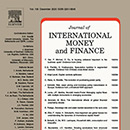
Journal of International Money and Finance (2021)
School’s author: Paul Mizen
In this paper, we focus on the surprising phenomenon in which firms face difficulty issuing in domestic currency even in the home market, especially in emerging markets. Could this be due to "original sin" which has been familiar to sovereign bond issuance? In its new incarnation, original sin refers to the difficulty firms in many emerging markets have in borrowing domestically long-term, even in the local currency. We infer the nature of original sin from 5,901 financing decisions by firms in seven Asian emerging markets over a period of 20 years.
Our sample period covers an episode when bond issuers had a choice between a less developed but growing onshore market, which varied across countries in the level of development, and a deep and liquid offshore market. We find that even in countries with onshore markets, it is often easier for unseasoned firms to issue offshore (in foreign currency) than to issue onshore, but changes in market development reverses this effect. In addition, once such a firm becomes a seasoned issuer, it is absolved from domestic original sin and is then able to act opportunistically and go to the market favoured by interest differentials.
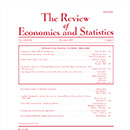
Review of Economics and Statistics (2021)
School’s author: Mikhail Poyker
I examine why the harmful tradition of female genital mutilation persists in certain countries while in others it has been eradicated. People are more willing to abandon their traditions if they are confident that the government is durable enough to set up long-term replacements for them. Using a country-ethnicity panel dataset spanning 23 countries from 1970 to 2013 and artificial partition of African ethnic groups by national borders, I show that a one-standard-deviation larger increase in political regime durability leads to a 0.1-standard-deviation larger decline in the share of newly-circumcised women, conditional on the presence of an anti-FGM government policy.

Journal of Economic Behavior and Organization (2021)
School’s author: Chris Starmer
We investigate whether uninformative relative performance feedback can create biases in confidence leading it to ‘snowball’. We study elicited confidence about own performance, relative to other group members, in three stages. As subjects move across stages, we change group composition so that new groups contain either only top performers or only bottom performers, from the previous stage. Between treatments, we manipulate whether subjects know about their own past relative performance or that of currently matched group members. In a treatment where subjects receive no feedback between stages, their confidence remains calibrated and stable across the stages. When subjects receive feedback in the other two treatments, their confidence snowballs in the direction of the feedback, both when feedback is fully informative and completely uninformative of their future performance. The results suggest the possibility of confidence biases emerging and snowballing in a potentially wide range of field settings.
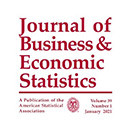
Journal of Business and Economic Statistics (2021)
School’s author: Lorenzo Trapani
We propose a testing based procedure to determine the number of common trends in a large non-stationary dataset. Our procedure is based on a factor representation, where we determine whether there are (and how many) common factors (i) with linear trends, and (ii) with stochastic trends. Cointegration among the factors is also permitted.
Our analysis is based on the fact that those largest eigenvalues of a suitably scaled covariance matrix of the data corresponding to the common factor part diverge, as the dimension N of the dataset diverges, whilst the others stay bounded. Therefore, we propose a class of randomised test statistics for the null that the p-th largest eigenvalue diverges, based directly on the estimated eigenvalue.
The tests only requires minimal assumptions on the data generating process. Monte Carlo evidence shows that our procedure has very good finite sample properties, clearly dominating competing approaches when no common trends are present. We illustrate our methodology through an application to US bond yields with different maturities observed over the last 30 years.

Journal of International Economics (2021)
School’s author: Markus Eberhardt
Commodity prices are one of the most important drivers of output fluctuations in developing countries. We show that a major channel through which commodity price movements can affect the real economy is through their effect on banks' balance sheets and financial stability. Our analysis finds that the volatility of commodity prices is a significant predictor of banking crises in a sample of 60 low-income countries (LICs). In contrast to recent findings for advanced and emerging economies, credit booms and capital inflows do not play a significant role in predicting banking crises, consistent with a lack of de facto financial liberalisation in LICs.
We corroborate our main findings with historical data for 40 ‘peripheral’ economies between 1848 and 1938. The effect of commodity price volatility on banking crises is concentrated in LICs with a fixed exchange rate regime and a high share of primary goods in production. We also find that commodity price volatility is likely to trigger financial instability through a reduction in government revenues and a shortening of sovereign debt maturity, which are likely to weaken banks' balance sheets.

Journal of International Economics (2021)
School’s author: Zhihong Yu
Global value chains have fundamentally transformed international trade and development in recent decades. We use matched firm-level customs and manufacturing survey data, together with Input-Output tables for China, to examine how Chinese firms position themselves in global production lines and how this evolves with productivity and performance over the firm lifecycle.
We document a sharp rise in the upstreamness of imports, stable positioning of exports, and rapid expansion in production stages conducted in China over the 1992–2014 period, both in the aggregate and within firms over time. Firms span more stages as they grow more productive, bigger and more experienced. This is accompanied by a rise in input purchases, value added in production, fixed costs incurred, and profits. We rationalise these patterns with a stylised model of the firm lifecycle with complementarity between the scale of production and the scope of stages performed.
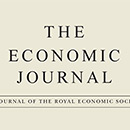
Economic Journal (2021)
School’s author: Giovanni Facchini
We develop a political economy model to study the decision of representative democracies to join a preferential trading agreement (PTA), distinguishing between free trade areas (FTA) and customs unions (CU). Our theoretical analysis shows that bilateral trade imbalances and income inequality are important factors determining the formation of PTAs, whereas the patterns of geographic specialisation explain whether a CU or an FTA will emerge. Our empirical analysis-using a comprehensive panel dataset spanning 187 countries over the period 1960-2015-provides strong support for these predictions.
Journal of Economic Literature (2021)
School’s author: Facundo Albornoz-Crespo
In an interconnected world, economic and political interests inevitably reach beyond national borders. Since policy choices generate external economic and political costs, foreign state and non-state actors have an interest in influencing policy actions in other sovereign countries to their advantage.
Foreign influence is a strategic choice aimed at internalising these externalities and takes three principal forms: (i) voluntary agreements, (ii) policy interventions based on rewarding or sanctioning the target country to obtain a specific change in policy, and (iii) institution interventions aimed at influencing the political institutions in the target country.
We propose a unifying theoretical framework to study when foreign influence is chosen and in which form, and use it to organise and evaluate the new political economics literature on foreign influence along with work in cognate disciplines.
American Economic Journal: Microeconomics (2021)
School’s author: Adrien Vigier
We compare a credit rating agency's incentives to acquire costly information when it is only paid for giving favourable ratings to the corresponding incentives when the agency is paid upfront, i.e. irrespective of the ratings assigned. We show that, in the presence of moral hazard, contingent fees provide stronger dynamic incentives to acquire information than upfront fees and may induce higher social welfare. When the fee structure is chosen by the agency, contingent fees arise as an equilibrium outcome, in line with the way the market for credit rating actually works.